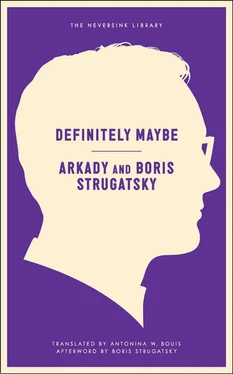Vecherovsky was huddled up in the chair, his face in his hands. It was unbearable.
“You see, Phil, all your suggestions, your plan of action, it’s probably all correct in theory,” Malianov said. “But we don’t need theory now. We need a plan that can be realized in real circumstances. You say: a united mankind. You see, for your plan, there may be some life-form that could do it, but not ours, not earthlings, I mean. Our people would never believe anything like that. You know when it will believe in a supercivilization? When that supercivilization stoops to our level and starts sprinkling us with bombs from whining spacecraft. Then we’ll believe, then we’ll be united, and even then not right away. We’ll probably wallop each other with a few salvos first.”
“That’s it exactly!” Weingarten agreed in an unpleasant voice and laughed curtly.
No one said anything.
“And my boss is a woman, anyway,” Zakhar said. “Very nice, very sweet, but how can I tell her about all this? About me, I mean?”
They all sat there silently sipping tea. Then Glukhov spoke softly.
“What wonderful tea! You really are a specialist, Dmitri. I haven’t had tea like this in ages. Yes… of course, all this is difficult and unclear. On the other hand, look at the sky, what a beautiful moon. Tea, a smoke—what else does man need? A good detective series on television? I don’t know. Now, you, Dmitri, you’re doing something with stars, with interstellar gases. Really, what business is it of yours? Just think about it. Something doesn’t want you to pry. Well, the answer is simple: Just don’t. Drink tea, watch television. The heavens aren’t for spying on—they’re for admiring.”
And then Zakhar’s boy announced out loud:
“You’re a sneak!”
Malianov thought that he meant Glukhov. But no. The boy, squinting like an adult, was looking at Vecherovsky and threatening him with a chocolate-covered finger.
“Sh, sh,” Zakhar whispered helplessly. Vecherovsky suddenly took his hands from his face and resumed his original position—lounging in the chair with his legs stretched out and crossed at the ankles. There was a grin on his face.
“So,” he said, “I am happy to prove that Comrade Weingarten’s hypothesis leads us to a dead end that is obvious to the naked eye. It’s easy to see that the hypothesis about the legendary Union of the Nine will lead us to the same dead end, as will the mysterious intelligence hiding in the depths of the seas or any other rational force. It would be very good if you all stopped and thought for a minute to convince yourselves of the correctness of what I say.”
Malianov stirred his tea and thought: The bastard! Did he have us going! Why? What’s the play-acting for? Weingarten was staring straight ahead, his eyes bulging slowly, his fat, sweaty cheeks twitching threateningly. Glukhov was staring at everyone in turn, and Zakhar waited patiently—the drama of the minute’s pause completely escaping him.
Then Vecherovsky spoke again.
“Note. In order to explain fantastic events we tried to use concepts that, however fantastic, still belonged in the realm of contemporary understanding. That yielded nothing. Absolutely nothing. Val proved that to us quite convincingly. Therefore, obviously, there is no point in applying concepts from outside the realm of contemporary understanding. Say, for instance, God or… or something else. Conclusion?”
Weingarten wiped his face nervously with his shirt and attacked his tea feverishly. Malianov asked in an injured tone:
“You mean, you were just making fools of us on purpose?”
“What else could I do?” Vecherovsky replied, raising his damn red eyebrows to the ceiling. “Prove to you that going to the authorities was useless? That it was meaningless to put the question the way you were? The Union of the Nine or Fu Manchu—what’s the difference? What is there to argue about? Whatever answer you got, there could be no practical course of action based on it. When your house burns down or is destroyed by a hurricane or is carried away by flood—you don’t think about what precisely happened to the house, you think about how you’re going to live, where you’re going to live, and what to do next.”
“You’re trying to say…” began Malianov.
“I’m saying that nothing interesting happened to you. There is nothing to be interested in here, nothing to study, nothing to analyze. All your seeking of causes is nothing more than wasteful idle curiosity. You shouldn’t be thinking about what kind of press is squeezing you; you should be thinking about how to behave under the pressure. And thinking about that is much more complex than fantasizing about King Asoka, because from now on each of you is alone ! No one will help you. No one will give you any advice. No one will decide for you. Not the academicians, not the government, not even progressive humanity—Val made that perfectly clear for you.”
He stood, poured himself some tea, and returned to his chair—intolerably confident, pulled together, elegantly casual, still looking like a peer at a diplomatic reception at the palace.
The boy read aloud:
“‘If the patient does not follow doctor’s orders, does not take his medication, and abuses alcohol, then approximately five or six years later the secondary phase is followed by the disease’s third—and last—stage.’”
Zakhar sighed.
“But why? Why me?”
Vecherovsky placed the cup in the saucer with a light clatter and put the saucer on the table next to him.
“Because our age is wearing black,” he explained, dabbing his pinkish gray equine lips with a snowy white handkerchief. “It is still wearing a tall top hat, and still we continue to run, and when the clock strikes the hour of inaction and the hour of leave-taking from daily cares, then comes the moment of division, and we no longer dream of anything—”
“The hell with you,” Malianov said, and Vecherovsky pealed with smug Martian guffaws.
Weingarten fished a longish butt out of the ashtray, stuck it between his fat lips, struck a match, and sat for a while, his crossed eyes focused on the glowing tip.
“Really,” he muttered, “does it really matter what power… as long as it is more powerful than humans?” He inhaled. “An aphid squashed by a brick and an aphid squashed by a coin… but I’m no aphid. I can choose.”
Zakhar looked at him hopefully, but Weingarten said nothing else. Choose, thought Malianov. That’s easy enough to say.
“That’s easy enough to say—choose!” Zakhar began, but Glukhov started talking. Zakhar looked at him hopefully.
“But it’s clear,” Glukhov said with unusual feeling. “Isn’t it obvious which you should choose? You must choose life! What else? Surely not your telescopes and test tubes. Let them choke on your telescopes! And interstellar gases! You have to live, love, feel nature—really feel it, not dig around in it! When I look at a tree or a bush now, I feel, I know that it is my friend, that we exist for each other, that we need each other.”
“Now?” Vecherovsky asked loudly.
Glukhov stuttered to a stop.
“Excuse me?”
“We’ve met, you know, Vladlen,” Vecherovsky said. “Remember? Estonia, the math-linguistics school? The sauna, the beer.”
“Yes, yes,” Glukhov said, lowering his eyes. “Yes.”
“You were quite different then,” Vecherovsky said.
“Well, back then…” Glukhov began. “Barons grow old, you know.”
“Barons also struggle,” Vecherovsky said. “It wasn’t so long ago.”
Glukhov spread his hands in silence.
Malianov understood nothing of this interlude, but there was something to it, something unpleasant, sinister, there was some reason for what they were saying to each other. And Zakhar, apparently, had understood, in his own way. Malianov felt some insult to himself in that brief exchange, because suddenly, with unusual harshness, almost with anger, he shouted at Vecherovsky:
Читать дальше












